温尼科特-反移情中的恨分析
儿童攻击性的精神分析式解读_温尼科特的攻击性理论

收稿日期:2007206210基金项目:江苏省教育科学“十一五”规划课题(C 2a /2006/01/014)作者简介:郗浩丽(1973—),女,博士,南京师大教育科学学院心理学系讲师。
2007年9月第5期南京师大学报(社会科学版)Journal of Nanjing Nor mal University (Social Science )Sep.,2007No .5儿童攻击性的精神分析式解读———温尼科特的攻击性理论郗浩丽(南京师范大学教育科学学院,江苏南京210097)摘 要:攻击性是儿童较为常见的行为,理论界对攻击性的认识一直存在分歧。
温尼科特的攻击性理论可以帮助我们从现代精神分析的视角理解儿童的攻击性。
温尼科特认为,攻击性是与生俱来的,但其性质随着婴儿成长所依赖环境的不同而改变,够好的环境使儿童的攻击性逐渐整合,不够好的环境迫使攻击性以破坏的、反社会的方式显示出来。
原初攻击性是原初爱的表达,并帮助儿童确立一个有自身界限的独立的外部世界。
从客体关联到客体使用的发展过程中,儿童攻击客体同时客体幸存于攻击导致儿童对现实的确认和对内部客体与外部客体的区分。
反社会倾向最初表达了被剥夺儿童的无助感,是向环境发出的求救信号,是对环境失败而阻碍情绪发展的一种补偿。
关键词:温尼科特;原初攻击性;客体使用;反社会倾向中图分类号:B84 文献标识码:A 文章编号:100124608(2007)0520111205 攻击性是儿童、青少年中一种比较常见的行为,其发展既影响儿童人格与品德的发展,也是个体社会化成败的一个重要指标。
尽管心理学家对攻击的科学研究已有近百年的历史,但是对攻击性质的认识仍存在分歧。
关于攻击获得和发生的机制,不同研究者从不同视角提出了不同的观点,比如,习性学家劳伦茨认为,攻击是人类和动物的本能;班杜拉则认为,儿童的攻击是一种习得的社会行为;多拉德等人于20世纪30年代曾提出过著名的挫折2攻击假说等。
温尼科特的精神分析客体关系理论的治疗观
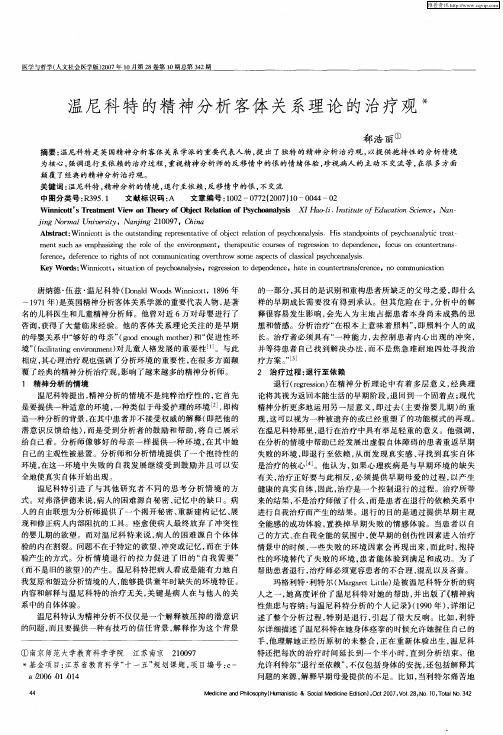
A src: i i t ite us n igrpeett eo bet e t no sconls .Hisadonso sconl i t a— bt tW n c ts h t adn er nai f j l i f yhaayi a no o t s v o c rao p s s t p it f yhaa t r t n p yc e
释很容易发生影 响 , 先人 为主地 占据患 者本 身尚未成 熟的思 会 想和情感 。分析 治疗“ 在根本 上意 味着 照料” 即照料个 人的成 , 长 。治疗者必须具 有“ 一种 能力 , 去控 制患者 内心 出现 的冲突 , 并等待患者 自己找 到解决 办法 , 不是焦 急难耐 地 四处 寻找治 而 疗 方 案 。[ ”0 ]
维普资讯
医学与哲学 ( 人文社会医学版 )0 7年 1 20 O月第 2 卷第 1 8 O期总第 3 2 4 期
温尼科 特 的精 神 分 析 客体 关 系理 论 的治疗 观 *
郗 浩 丽
摘要 : 温尼科特是英 国精神 分析 客体 关 系学派的重要代表 人物 , 出了独特 的精神 分析 治疗观 , 提 以提供抱 持性 的分析情境 为核 心。 强调退行至依 赖的治疗过程 , 重视精神分析师的反移情 中的恨 的情绪体验 , 珍视 病人 的主 动不交流等 , 很 多方 面 在
颠覆 了经 典 的精 神 分析 治 疗 观 。
关键词 : 温尼科特 。 精神分析 的情境 , 退行 至依赖 , 反移情 中的恨 , 不交流
中 图分 类 号 : 35 1 R 9 文献标识码 : A 文章 编 号 :0 2 7 2 20 )0—0 4 10 —0 7 (0 7 1 0 4—0 2
温尼科特的生平和理论无锡市新区总工会课件

温尼科特关于真实自体的理论
01
真实自体的概念
真实自体是指个体在内心深处感受到的真实自我,是个人独特性和真实
性的体现。
02 03
真实自体的形成
温尼科特认为真实自体的形成是在婴儿与母亲的互动中逐渐形成的,当 婴儿感受到母亲的理解和支持时,他们就能更好地发展自己的真实自体 。
真实自体与心理健康
温尼科特认为真实自体的健康发展对于个体的心理健康非常重要,真实 自体的表达和展现可以帮助个体更好地应对生活中的挑战和压力。
04 温尼科特理论的应用和启 示
温尼科特理论在儿童心理治疗中的应用
总结词
儿童中心、真实环境、无条件积极关注、抱持性环境
详细描述
温尼科特理论在儿童心理治疗中强调儿童为中心,创设真实环境,为儿童提供无条件积极关注,以及建立抱持性 环境。这些理念有助于促进儿童自我实现和健康成长。
温尼科特理论在家庭治疗中的应用
温尼科特理论对无锡市新区总工会的启示
总结词
工会角色、工人权益、工人发展、社会和谐
详细描述
温尼科特理论对无锡市新区总工会具有启示 作用。工会应扮演重要角色,关注工人权益 和发展,致力于实现社会和谐。通过维护工 人权益和提高工人发展水平,工会可为社会 和谐作出积极贡献。
THANKS FOR WATCHING
温尼科特关注婴儿早期的发展,认为 婴儿与母亲的互动对个体发展至关重 要
温尼科特还关注儿童游戏的作用,认 为游戏可以帮助儿童发展自我和建立 关系
02 温尼科特的理论概述
温尼科特理论的基本概念
过渡性客体
在理论中,过渡性客体指的是一个物体或者人,他们在婴儿 和外部世界之间起到桥梁作用,帮助婴儿逐渐建立自我和现 实感。
《08:客体关系(温尼科特)--李鸣老师精神分析微课》听课笔记
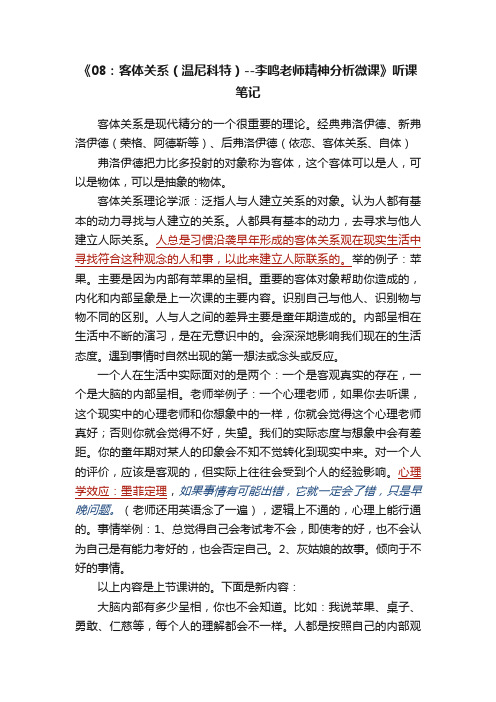
《08:客体关系(温尼科特)--李鸣老师精神分析微课》听课笔记客体关系是现代精分的一个很重要的理论。
经典弗洛伊德、新弗洛伊德(荣格、阿德靳等)、后弗洛伊德(依恋、客体关系、自体)弗洛伊德把力比多投射的对象称为客体,这个客体可以是人,可以是物体,可以是抽象的物体。
客体关系理论学派:泛指人与人建立关系的对象。
认为人都有基本的动力寻找与人建立的关系。
人都具有基本的动力,去寻求与他人建立人际关系。
人总是习惯沿袭早年形成的客体关系观在现实生活中寻找符合这种观念的人和事,以此来建立人际联系的。
举的例子:苹果。
主要是因为内部有苹果的呈相。
重要的客体对象帮助你造成的,内化和内部呈象是上一次课的主要内容。
识别自己与他人、识别物与物不同的区别。
人与人之间的差异主要是童年期造成的。
内部呈相在生活中不断的演习,是在无意识中的。
会深深地影响我们现在的生活态度。
遇到事情时自然出现的第一想法或念头或反应。
一个人在生活中实际面对的是两个:一个是客观真实的存在,一个是大脑的内部呈相。
老师举例子:一个心理老师,如果你去听课,这个现实中的心理老师和你想象中的一样,你就会觉得这个心理老师真好;否则你就会觉得不好,失望。
我们的实际态度与想象中会有差距。
你的童年期对某人的印象会不知不觉转化到现实中来。
对一个人的评价,应该是客观的,但实际上往往会受到个人的经验影响。
心理学效应:墨菲定理,如果事情有可能出错,它就一定会了错,只是早晚问题。
(老师还用英语念了一遍),逻辑上不通的,心理上能行通的。
事情举例:1、总觉得自己会考试考不会,即使考的好,也不会认为自己是有能力考好的,也会否定自己。
2、灰姑娘的故事。
倾向于不好的事情。
以上内容是上节课讲的。
下面是新内容:大脑内部有多少呈相,你也不会知道。
比如:我说苹果、桌子、勇敢、仁慈等,每个人的理解都会不一样。
人都是按照自己的内部观去理解这个世界的。
婴儿的感觉是如何归因的,最初形成对自己的看法,是双亲对孩子的态度决定的。
从客体关系理论理解咨询关系中的移情与反移情
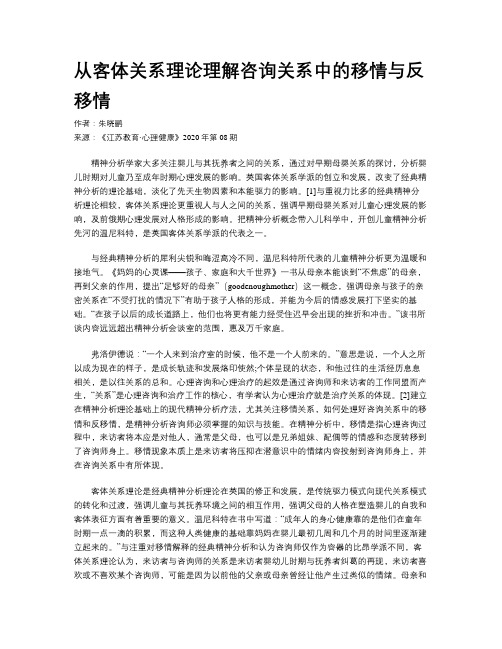
从客体关系理论理解咨询关系中的移情与反移情作者:朱晓鹂来源:《江苏教育·心理健康》2020年第08期精神分析学家大多关注婴儿与其抚养者之间的关系,通过对早期母婴关系的探讨,分析婴儿时期对儿童乃至成年时期心理发展的影响。
英国客体关系学派的创立和发展,改变了经典精神分析的理论基础,淡化了先天生物因素和本能驱力的影响。
[1]与重视力比多的经典精神分析理论相较,客体关系理论更重视人与人之间的关系,强调早期母婴关系对儿童心理发展的影响,及前俄期心理发展对人格形成的影响。
把精神分析概念带入儿科学中,开创儿童精神分析先河的温尼科特,是英国客体关系学派的代表之一。
与经典精神分析的犀利尖锐和晦涩高冷不同,温尼科特所代表的儿童精神分析更为温暖和接地气。
《妈妈的心灵课——孩子、家庭和大千世界》一书从母亲本能谈到“不焦虑”的母亲,再到父亲的作用,提出“足够好的母亲”(goodenoughmother)这一概念,强调母亲与孩子的亲密关系在“不受打扰的情况下”有助于孩子人格的形成,并能为今后的情感发展打下坚实的基础。
“在孩子以后的成长道路上,他们也将更有能力经受住迟早会出现的挫折和冲击。
”该书所谈内容远远超出精神分析会谈室的范围,惠及万千家庭。
弗洛伊德说:“一个人来到治疗室的时候,他不是一个人前来的。
”意思是说,一个人之所以成为现在的样子,是成长轨迹和发展烙印使然;个体呈现的状态,和他过往的生活经历息息相关,是以往关系的总和。
心理咨询和心理治疗的起效是通过咨询师和来访者的工作同盟而产生,“关系”是心理咨询和治疗工作的核心,有学者认为心理治疗就是治疗关系的体现。
[2]建立在精神分析理论基础上的现代精神分析疗法,尤其关注移情关系,如何处理好咨询关系中的移情和反移情,是精神分析咨询师必须掌握的知识与技能。
在精神分析中,移情是指心理咨询过程中,来访者将本应是对他人,通常是父母,也可以是兄弟姐妹、配偶等的情感和态度转移到了咨询师身上。
温尼科特

抑郁是健康的:抑郁是一种能力;抑
郁是一种情感障碍;抑郁是为了避免 抑郁的伤痛而动员起来的防御。 担忧:用担忧一词强调内疚感的积极
作用。
6、青春期的发展
退行是治疗过程的要素
1、退行的目的是为了通过提供早期主观全能感觉的成
功体验,置换掉时期失败的情感体验。
2、咨询师应提供抱持的环境。
3、退行与退缩:退行具有治疗特性,早期的体验可以在退行中修正;退缩 不具有治疗特性,是病人在治疗中哭求帮助的表示。
首先 是要提供一 种适意的环境,一种类似母爱照料的环境。
4、将精神分析的设置变为抱持的环境,强调精神分析师的行为。
只有完美的客体才值得破坏
1、原初攻击性是婴儿活动的一部分,它导
致了对外在客体的发现,是爱的表达。 2、婴儿本能的爱是无情的,这个阶段的婴
儿攻击母亲实际在是在毫无顾忌的爱她。母
亲的反应是情绪性攻击发展的重要方面。约 2岁之前。 3、母亲做为客体的对立存在,使婴儿全身心 的本能体验成为可能。 4、客体使用:主体破坏客体如果客体幸存, 那么儿童就能够使用客体,不能幸存儿童过 早的注意外在会感到危险。
温尼科特的主要理论(这此只是个人罗列)
二战期间主要理论: 够好的母亲与促进性环境 反社会倾向 反移情中的恨 抱持的治疗环境 50到60年代: 真自体与假自体 攻击性概念 过度客体概念 幻觉与幻灭 后期思想: 《游戏与现实》 “客体的使用” 母亲与家庭对儿童的镜像作用 “游戏” 与“创造性” 压舌板与涂鸦游戏
11
1、游戏的性质与功能 2、游戏与创造性 3、游戏与心理治疗
4、压舌板游戏
5、涂鸦游戏
12
请允许我退行到抱持环境里,因为我还需要成长!
祝愿每一个孩子,每一个母亲, 每一个家庭都是幸福的!
对温尼科特的几个重要概念的理解镜映伪自体过渡性客体
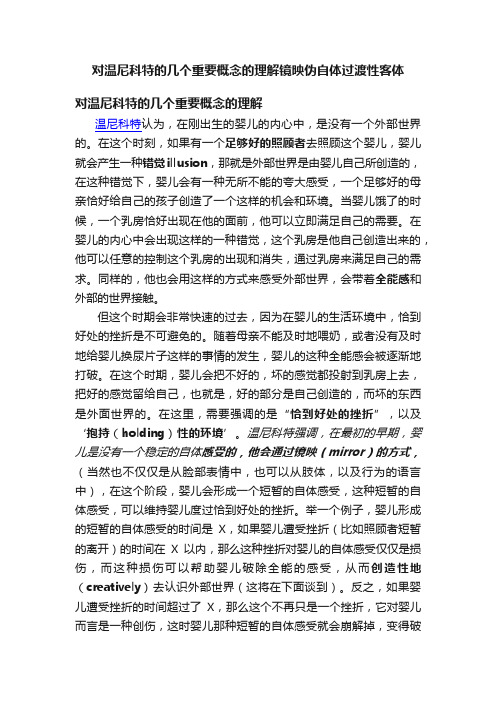
对温尼科特的几个重要概念的理解镜映伪自体过渡性客体对温尼科特的几个重要概念的理解温尼科特认为,在刚出生的婴儿的内心中,是没有一个外部世界的。
在这个时刻,如果有一个足够好的照顾者去照顾这个婴儿,婴儿就会产生一种错觉illusion,那就是外部世界是由婴儿自己所创造的,在这种错觉下,婴儿会有一种无所不能的夸大感受,一个足够好的母亲恰好给自己的孩子创造了一个这样的机会和环境。
当婴儿饿了的时候,一个乳房恰好出现在他的面前,他可以立即满足自己的需要。
在婴儿的内心中会出现这样的一种错觉,这个乳房是他自己创造出来的,他可以任意的控制这个乳房的出现和消失,通过乳房来满足自己的需求。
同样的,他也会用这样的方式来感受外部世界,会带着全能感和外部的世界接触。
但这个时期会非常快速的过去,因为在婴儿的生活环境中,恰到好处的挫折是不可避免的。
随着母亲不能及时地喂奶,或者没有及时地给婴儿换尿片子这样的事情的发生,婴儿的这种全能感会被逐渐地打破。
在这个时期,婴儿会把不好的,坏的感觉都投射到乳房上去,把好的感觉留给自己,也就是,好的部分是自己创造的,而坏的东西是外面世界的。
在这里,需要强调的是“恰到好处的挫折”,以及‘抱持(holding)性的环境’。
温尼科特强调,在最初的早期,婴儿是没有一个稳定的自体感受的,他会通过镜映(mirror)的方式,(当然也不仅仅是从脸部表情中,也可以从肢体,以及行为的语言中),在这个阶段,婴儿会形成一个短暂的自体感受,这种短暂的自体感受,可以维持婴儿度过恰到好处的挫折。
举一个例子,婴儿形成的短暂的自体感受的时间是X,如果婴儿遭受挫折(比如照顾者短暂的离开)的时间在X以内,那么这种挫折对婴儿的自体感受仅仅是损伤,而这种损伤可以帮助婴儿破除全能的感受,从而创造性地(creatively)去认识外部世界(这将在下面谈到)。
反之,如果婴儿遭受挫折的时间超过了X,那么这个不再只是一个挫折,它对婴儿而言是一种创伤,这时婴儿那种短暂的自体感受就会崩解掉,变得破碎不堪,只有等到照顾者回来,重新让婴儿建立起一种短暂的自体感受,这种自体感受才会恢复。
同理、反移情、投射认同
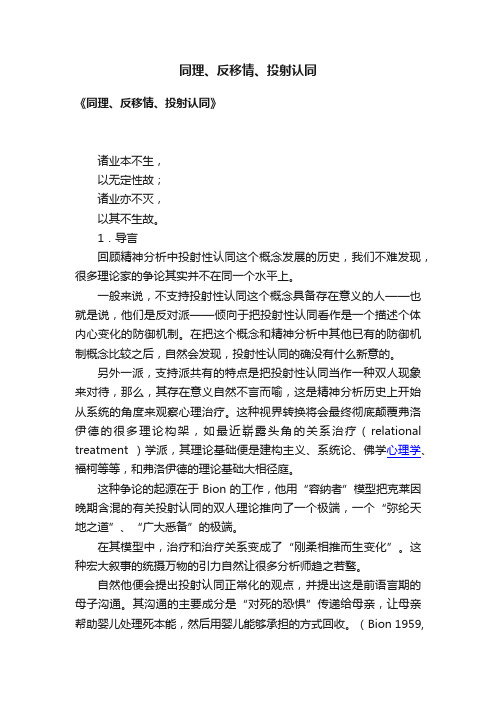
同理、反移情、投射认同《同理、反移情、投射认同》诸业本不生,以无定性故;诸业亦不灭,以其不生故。
1.导言回顾精神分析中投射性认同这个概念发展的历史,我们不难发现,很多理论家的争论其实并不在同一个水平上。
一般来说,不支持投射性认同这个概念具备存在意义的人——也就是说,他们是反对派——倾向于把投射性认同看作是一个描述个体内心变化的防御机制。
在把这个概念和精神分析中其他已有的防御机制概念比较之后,自然会发现,投射性认同的确没有什么新意的。
另外一派,支持派共有的特点是把投射性认同当作一种双人现象来对待,那么,其存在意义自然不言而喻,这是精神分析历史上开始从系统的角度来观察心理治疗。
这种视界转换将会最终彻底颠覆弗洛伊德的很多理论构架,如最近崭露头角的关系治疗(relational treatment )学派,其理论基础便是建构主义、系统论、佛学心理学、福柯等等,和弗洛伊德的理论基础大相径庭。
这种争论的起源在于Bion的工作,他用“容纳者”模型把克莱因晚期含混的有关投射认同的双人理论推向了一个极端,一个“弥纶天地之道”、“广大悉备”的极端。
在其模型中,治疗和治疗关系变成了“刚柔相推而生变化”。
这种宏大叙事的统摄万物的引力自然让很多分析师趋之若鹜。
自然他便会提出投射认同正常化的观点,并提出这是前语言期的母子沟通。
其沟通的主要成分是“对死的恐惧”传递给母亲,让母亲帮助婴儿处理死本能,然后用婴儿能够承担的方式回收。
(Bion 1959,1962, 1963, 1965, 1970, 1977, 1992)前语言期,这才是投射认同的两派争论的焦点,其实投射认同这个术语的反对派在这个时期看到的个体内部的自恋认同,而支持派看到的是两人系统中的一方投射,另一方认同。
如果我们把投射认同定位为双人系统中无意识交流的一个基本单位的话,就不免要考察治疗关系这个两人系统中的投射认同。
而传统精神分析一般是用移情-反移情,同理(empathy)来描述治疗关系的。
温尼科特的客体关系

3)发展主观全能感
4)找回过渡自体 5)独立
反移情与反移情中的恨
交流与不交流
精神分析的游戏治疗
1.理论与本质
2.性质与功能 3.游戏治疗的一种方法:潦草画线游戏
在游戏中,婴儿 、儿童和成人在过渡空间沟
通了内部世界与外部世界。游戏的质量等同 于创造性的生活,构成了纵观生命始终的自 我体验的模板。
分接纳使得婴儿的幻想和行为没有区别。
四)过渡客体与象征 的使用
在运用过渡客体的婴儿只是在学习使用象征。因
此过渡客体表明是从客体联系向客体使用发展的 一个过渡。 当象征被使用的时候,婴儿已经可以清楚地辨明 幻想与现实,内部客体与外部客体,原初的创作 性与知觉。 在原始形式中,儿童将过渡客体(如:深切依恋 的一块毛毯,一个枕头,一个喜爱的玩具或一只 布熊)作为替代物,作为对母亲形象的移植,以 使能忍受与母亲越来越多的分离。
2.促进性环境(抱持性环境)
母亲是最早的环境,够好的母亲节是促进性 环境,它完成了婴儿对需要的适应。母亲创 造了一个抱持性的物理和心理环境,让婴儿 得到了保护。 3.原初母爱贯注 “够好的母亲”提供婴儿所需环境的心理状 。
4.主观全能感
缺失的程度和质量。他从早期婴儿成熟过程 的角度看待心理疾病。 1)心理神经症 2)中间性疾病 3)精神病
4.治疗过程
重新体验一次成长过程,提供不一样的环境 母亲自然的允许一个包含不同体验的整个过程自 然地发展,直到儿童足够大了,能够理解她的观 点的时候,才给予干预。
1)退行至依赖 2)提供抱持性环境
如果我们是健康的,我们正生活在中间领域
第三领域,过渡性空间里。依赖于各自的文 化,我们以不同的方式追逐兴趣——读书, 游戏,踢球,跳舞。
温尼科特的儿童精神分析理论述评
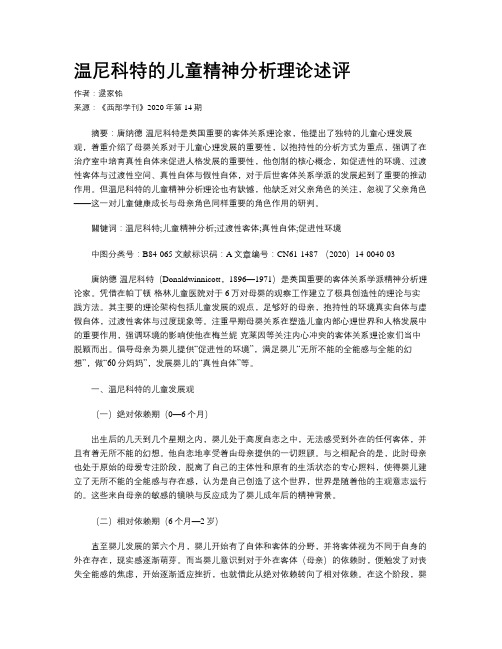
温尼科特的儿童精神分析理论述评作者:逯家铭来源:《西部学刊》2020年第14期摘要:唐纳德·温尼科特是英国重要的客体关系理论家,他提出了独特的儿童心理发展观,着重介绍了母婴关系对于儿童心理发展的重要性,以抱持性的分析方式为重点,强调了在治疗室中培育真性自体来促进人格发展的重要性,他创制的核心概念,如促进性的环境、过渡性客体与过渡性空间、真性自体与假性自体,对于后世客体关系学派的发展起到了重要的推动作用。
但温尼科特的儿童精神分析理论也有缺憾,他缺乏对父亲角色的关注,忽视了父亲角色——这一对儿童健康成长与母亲角色同样重要的角色作用的研判。
關键词:温尼科特;儿童精神分析;过渡性客体;真性自体;促进性环境中图分类号:B84-065文献标识码:A文章编号:CN61-1487-(2020)14-0040-03唐纳德·温尼科特(Donaldwinnicott,1896—1971)是英国重要的客体关系学派精神分析理论家。
凭借在帕丁顿·格林儿童医院对于6万对母婴的观察工作建立了极具创造性的理论与实践方法。
其主要的理论架构包括儿童发展的观点,足够好的母亲,抱持性的环境真实自体与虚假自体,过渡性客体与过度现象等。
注重早期母婴关系在塑造儿童内部心理世界和人格发展中的重要作用,强调环境的影响使他在梅兰妮·克莱因等关注内心冲突的客体关系理论家们当中脱颖而出。
倡导母亲为婴儿提供“促进性的环境”,满足婴儿“无所不能的全能感与全能的幻想”,做“60分妈妈”,发展婴儿的“真性自体”等。
一、温尼科特的儿童发展观(一)绝对依赖期(0—6个月)出生后的几天到几个星期之内,婴儿处于高度自恋之中,无法感受到外在的任何客体,并且有着无所不能的幻想。
他自恋地享受着由母亲提供的一切照顾。
与之相配合的是,此时母亲也处于原始的母爱专注阶段,脱离了自己的主体性和原有的生活状态的专心照料,使得婴儿建立了无所不能的全能感与存在感,认为是自己创造了这个世界,世界是随着他的主观意志运行的。
客体关系理论

客体关系理论是心理动力取向的人格发展理论,主张人类行为的动力源自寻求客体。
客体关系理论是在精神分析的理论框架中探讨人际关系,更强调环境的影响。
认为真正影响一个人精神发展过程的是在出生早期婴儿与父母的关系。
此理论探讨的是婴儿与母亲的关系如何影响个体的精神结构以及个体如何成长起来,将人格发展的重心从俄底普斯情结转移到从出生到 3 岁的俄底普斯前期的冲突之上。
客体一词为弗洛伊德所使用,对婴儿而言,客体指满足需求的事物,对儿童而言,客体一词可与『他人』互换,客体关系即指人际关系。
而此等人际关系乃塑造了个体当前与人们之间的互动情形,不论是真实的或幻想的。
客体关系是指存在一个人内在精神中的人际关系形态的模式。
客体是一个与自体相对应的概念,客体指的是一个被爱着或恨着的人物,地方,东西,或者幻想,包括内在客体和外在客体。
外在客体是指真正的人物,地方和东西,内在客体指的是心理表象,即与客体有关的影象,想法,幻想,感觉或记忆。
自体也是一种心理表象,指的总是一个内在的影象,基本上是属于自己的想法,感觉或幻想。
客体关系理论的重要假定是,自我与他人的关系型态一旦建立,就会影响其日后的人际关系。
进而言之,人们会去寻找符合过去已建立过关系型态的关系。
例如:过于依赖与过于孤僻的人,有可能是在重复著刚学走路时与母亲所建立起来的关系型态。
客体: 是与主体相对应的概念,指某个体的意愿、情感、行为所指向的人。
部分客体: 初生的婴儿只能根据他所体验到的客体的好“”或坏“”来代表这个客体,此时,他所体验到的只是客体的部分特征,故称之为部分客体。
完整客体 : 当婴儿能够同时体验到客体既能给他带来满足,又会使其受到挫折等多面性时,他是将客体作为一个完整的整体在体验,这就是所谓完整客体。
过渡性客体:它是指当婴儿意识到与母亲的非共生性以后,为缓解由此引起的对现实的焦虑与孤独感而创造出的一个部分主观取向、部分现实取向的过渡性情景。
最典型的过渡性客体有柔软的毯子、玩具,甚至入睡前的某种特定的物品或声音等。
案例三知其不安守望见心

英国精神分析学家温尼科特认为虚假自体具有不同的程度,阿紫的虚假自体可能是比较极端的。
这个虚假自体起初为她赢得了受欢迎的环境,但在后续的过程中慢慢表现欠佳,因为它缺乏自发的创造力,并与无用和绝望感相关联,而且真实自体一直是被隐藏的,非常压抑,所以阿紫一回家脾气就变得很坏。
通过对反移情的觉察和分析、对防御的解释以及让无意识意识化,阿紫对自己真实的情绪感受有了更多的体验,对自己在人际关系中的疲惫、烦躁也有了更多的理解。
2.对移情的觉察和分析。
与此相关,阿紫通过察言观色猜测我可能不喜欢她第一次的穿着,所以第二次咨询时就换了她认为我会喜欢的打扮,以此引发我感觉上的变化。
她将自己放在一个卑微的位置,通过讨好让重要他人喜欢自己,这是一种移情,因为她和妈妈就是这样的关系模式。
四、咨询效果随着时间缓缓流逝,咨询关系的进展使得阿紫愿意表达更多的感受。
她尝试参加社交活动,对同学的态度不会时刻在意了,闲暇时看看小说,内心有愉悦感。
升入高年级之后,阿紫开始考虑未来的职业,参加一些职业资格考试。
在咨询进行到将近3年时,阿紫慢慢意识到妈妈其实是嫌弃她的,并且妈妈抑郁之后就不太关注她了。
初中时她非常努力,想让妈妈看到自己还不错,考试失败之后她很恐惧,怕妈妈认为她不行。
所以,从那之后她对学习产生了强烈的排斥感,生怕再次失败。
残酷的真相带来了强烈的情绪,在咨询室里阿紫哭得很厉害,原来所有的努力都是为了让妈妈看到更好的自己,和焦虑相关的症状很大程度来自这个幻想,阿紫一直希望成为妈妈眼中的骄傲。
幻想的意识化带来的改变是脱胎换骨的,阿紫意识到妈妈不关注她不是因为自己的原因,而是妈妈自身的欠缺和疾病的关系。
于是阿紫开始了自己的选择和创造,她一边写论文准备毕业,一边积极参加社会实习。
学习方面没有原来那么大的阻力了,她学习了很多新知识,主动和实习单位的同事进行交流,遇到挫折会安慰和开解自己。
五、咨询感悟阿紫最初的症状非常复杂,压抑的情感也很难表达,很长时间她都在欺骗自己,让自己认为妈妈是爱她的、关心她的。
马苏德汗的主要影响
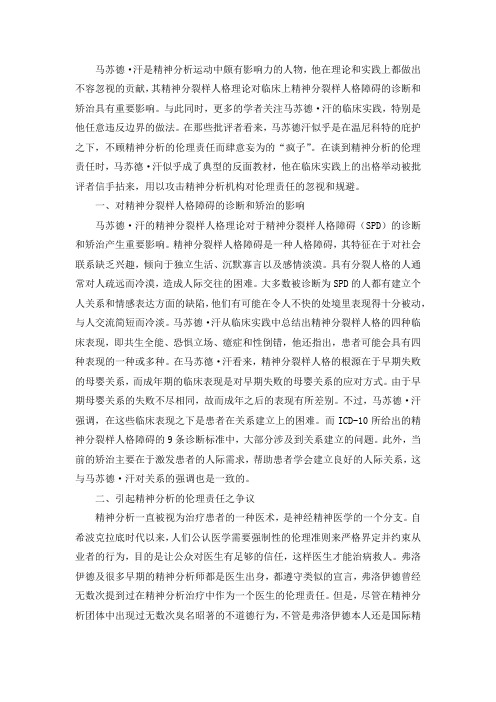
马苏德·汗是精神分析运动中颇有影响力的人物,他在理论和实践上都做出不容忽视的贡献,其精神分裂样人格理论对临床上精神分裂样人格障碍的诊断和矫治具有重要影响。
与此同时,更多的学者关注马苏德·汗的临床实践,特别是他任意违反边界的做法。
在那些批评者看来,马苏德汗似乎是在温尼科特的庇护之下,不顾精神分析的伦理责任而肆意妄为的“疯子”。
在谈到精神分析的伦理责任时,马苏德·汗似乎成了典型的反面教材,他在临床实践上的出格举动被批评者信手拈来,用以攻击精神分析机构对伦理责任的忽视和规避。
一、对精神分裂样人格障碍的诊断和矫治的影响马苏德·汗的精神分裂样人格理论对于精神分裂样人格障碍(SPD)的诊断和矫治产生重要影响。
精神分裂样人格障碍是一种人格障碍,其特征在于对社会联系缺乏兴趣,倾向于独立生活、沉默寡言以及感情淡漠。
具有分裂人格的人通常对人疏远而冷漠,造成人际交往的困难。
大多数被诊断为SPD的人都有建立个人关系和情感表达方面的缺陷,他们有可能在令人不快的处境里表现得十分被动,与人交流简短而冷淡。
马苏德·汗从临床实践中总结出精神分裂样人格的四种临床表现,即共生全能、恐惧立场、癔症和性倒错,他还指出,患者可能会具有四种表现的一种或多种。
在马苏德·汗看来,精神分裂样人格的根源在于早期失败的母婴关系,而成年期的临床表现是对早期失败的母婴关系的应对方式。
由于早期母婴关系的失败不尽相同,故而成年之后的表现有所差别。
不过,马苏德·汗强调,在这些临床表现之下是患者在关系建立上的困难。
而ICD-10所给出的精神分裂样人格障碍的9条诊断标准中,大部分涉及到关系建立的问题。
此外,当前的矫治主要在于激发患者的人际需求,帮助患者学会建立良好的人际关系,这与马苏德·汗对关系的强调也是一致的。
二、引起精神分析的伦理责任之争议精神分析一直被视为治疗患者的一种医术,是神经精神医学的一个分支。
当代精神分析治疗概念的新进展

神经入由: 恰经好• 验的—挫从折—作,逼病近为人的一逐了渐解块去白幻像板化治而发疗展师其自的体治,通疗过转到变互的内动化治作用疗而:到治达疗健康时自间体的多重了建。一个了解病人的面向, 新版反移情概分念析:分家析通师对过病了人的解所自有感己受的体验情(感温尼和科幻特 想194反9 、应海而曼 1进950一、步比昂深1入959了)解来访者
当代精神分析 治疗概念的新进展
徐钧
一.引子
精神分析发展的介绍
精神分析派流派发展树
精神分析的发展:从三到一到互动
• 古典精神分析的三人关系:俄底浦斯 情结
• 客体关系理论的二人关系:客体关系 =“自体—客体” 单元
• 一人的主体性:自体心理学中的自体 与自体客体的重叠融合
• 互动建构:主体间学派
• 夸大自体与镜映移情、理想化自体与理想化移情、另我自 自恋是一种藉著胜任的经验而产生的真正自我价值感,是一种认为自己值得珍惜、保护的真实感觉也就是说一般个体的自恋是健康的,
而且社会也是允许适度自恋的而只有个体过度自恋,并超出了社会对于自恋允可的范围那才是不健康的。
体与密友移情 结果,若孩子内射了许多恰到好处的挫折经验,那他婴儿期驱力就可被一种平静、安抚及关爱的态度驾驭,而不是被一种父母的反攻
精神分析• 发展反的移介绍情概念的转变 :
当代精神分析 治疗概念的新进展
自恋是一• 种藉传著统胜任的的反经验移而情产生概的念真正:分自我析价师值感由,于是一自种己认为过自去己值未得解珍惜决、情保护结的或真实者感被觉也病就人是说激一发般个某体些的自情恋结是健, 康的, 而一且个社 精会神也分是析而允师发许与适一生度位对自来恋访病的者人而,只如的有果情个重体复感过了转度上自述移恋过现,程并,象超我。出们了也社称会这对位于分自析恋师允为可患的者范的围容那器才(是容不器健 )康患的者。被称之为被容纳者(包含了)。 一个精神• 分析在师弗与一洛位伊来访德者看,如来果,重所复以了上的述反过程移,情我们现也象称这都位是分析治师疗为患的者障的容碍器。(容器)患者被称之为被容纳者(包含了)。
温尼科特读书笔记

为什么治疗中咨询师不能表达出对来访者的恨?P69
分析师需要先恨病人?P70
防御是紧张痛苦的(我是一直在防御吗?所以我这么痛苦紧张?我再防御什么呢?如何放下放下我的防御?)
《儿童、家庭与外部世界》是温尼科特的畅销书。
如果母亲在婴儿攻击后能够幸存,这会让婴儿人认识到,母亲不是她的一部分,不再他的控制之下,因此,攻击时一个重要的发展性力量。
如果母亲不能应对婴儿对她的攻击,尤其当当她报复的时候。
这时候所发生的破坏性,就会成为儿童人格中的一个特征,儿童可能通过抑制攻击或将攻击专项自身来进行防御。
正是这样的背景中,温尼科特提出,在临床环境中,越是有攻击性的儿童就越健康。
温尼科特的亲子关系理论

以他的虚假自体和反社会倾向两个理论为例。
他的虚假自体理论提出,不安全的环境或者愿望被反复地忽视将导致儿童出现顺从的反应,即用顺从去满足养育者,这就是虚假自体的发展,这种顺从导致儿童与自己自发的、赋予生命以意义的核心保持一种隔离状态。
这提示我们,过于顺从听话的孩子过着孤立虚假的生活,与人建立虚假的关系,不能自然的活动,缺少真实感和生命意义感,因此“顺从听话”不应该成为衡量儿童的标准。
他的反社会倾向理论提出,儿童青少年的反社会行为,如偷窃、滥交、吸毒、暴力等行为最初表达了被剥夺儿童的一种无助感,他们希望找到一种方式以填补良好环境连续性的断裂,这种反社会行为是向养育者发出的求救信号,是对环境失败阻碍情绪发展的一种补偿。
处理这种反社会行为,除了可以提供个别心理治疗外,最主要的是要提供一个关爱的,逐渐增加自由度的稳定环境。
对于青少年的反社会行为,我们一般的处理方式是诉诸道德教育和法律管制。
不管哪种方式,都是寻求外在于青少年的具有统一规范标准的强制性力量,却没有触及反社会行为的内在根源,因而即使改变也是暂时的。
温尼科特的精神分析思想有助于了解、深入儿童青少年的内心世界。
•在心理治疗学界之间当代客体关系理论的流行新潮,使长期以来颇受争议的精神分析学又燃起了生命的火花。
佛洛伊德的传统精神分析乃建立在以生物学为基础,介于神经学心理学之间的桥梁,以趋力之本能为出发点的理论。
近年来由英国兴起的客体关系理论渐渐地在美国精神分析界掀起了一阵热潮,其中的主要理由包括它对当代社会形态影响之下而易塑造成的人格违常,包括自恋性人格、边缘性人格,以及精神分裂样人格等有了可以令人折服的精神分析治疗理论与方法,而此之前此方面在传统精神分析上则显得教无力感而且引发重重争议。
另一原因是当代社会形态工商业化以及家庭结构大家庭变核心家庭的改变。
其所表现出来的,一般而言是工作忙碌、价值多元,人际关系呈现疏离现象,特别是亲子关系面临威胁。
而在此以强调母子之间亲子关系对人格之影响的客体关系理论,就明显地受到注意起来了。
回避型依恋来访工作的内在工作模式与反移情
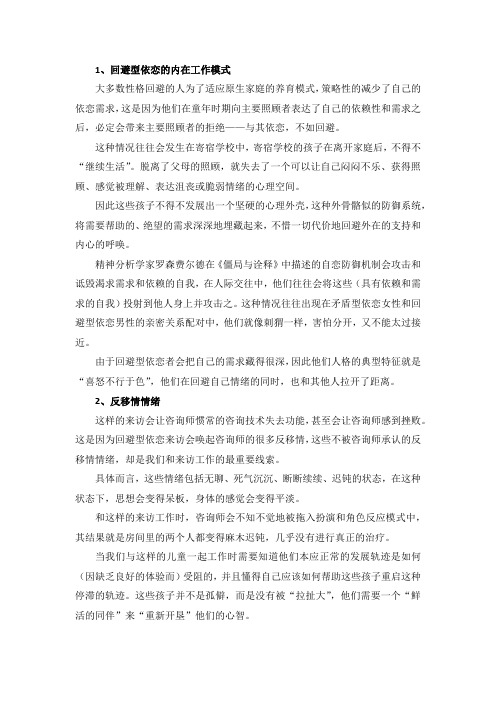
1、回避型依恋的内在工作模式大多数性格回避的人为了适应原生家庭的养育模式,策略性的减少了自己的依恋需求,这是因为他们在童年时期向主要照顾者表达了自己的依赖性和需求之后,必定会带来主要照顾者的拒绝——与其依恋,不如回避。
这种情况往往会发生在寄宿学校中,寄宿学校的孩子在离开家庭后,不得不“继续生活”。
脱离了父母的照顾,就失去了一个可以让自己闷闷不乐、获得照顾、感觉被理解、表达沮丧或脆弱情绪的心理空间。
因此这些孩子不得不发展出一个坚硬的心理外壳,这种外骨骼似的防御系统,将需要帮助的、绝望的需求深深地埋藏起来,不惜一切代价地回避外在的支持和内心的呼唤。
精神分析学家罗森费尔德在《僵局与诠释》中描述的自恋防御机制会攻击和诋毁渴求需求和依赖的自我,在人际交往中,他们往往会将这些(具有依赖和需求的自我)投射到他人身上并攻击之。
这种情况往往出现在矛盾型依恋女性和回避型依恋男性的亲密关系配对中,他们就像刺猬一样,害怕分开,又不能太过接近。
由于回避型依恋者会把自己的需求藏得很深,因此他们人格的典型特征就是“喜怒不行于色”,他们在回避自己情绪的同时,也和其他人拉开了距离。
2、反移情情绪这样的来访会让咨询师惯常的咨询技术失去功能,甚至会让咨询师感到挫败。
这是因为回避型依恋来访会唤起咨询师的很多反移情,这些不被咨询师承认的反移情情绪,却是我们和来访工作的最重要线索。
具体而言,这些情绪包括无聊、死气沉沉、断断续续、迟钝的状态,在这种状态下,思想会变得呆板,身体的感觉会变得平淡。
和这样的来访工作时,咨询师会不知不觉地被拖入扮演和角色反应模式中,其结果就是房间里的两个人都变得麻木迟钝,几乎没有进行真正的治疗。
当我们与这样的儿童一起工作时需要知道他们本应正常的发展轨迹是如何(因缺乏良好的体验而)受阻的,并且懂得自己应该如何帮助这些孩子重启这种停滞的轨迹。
这些孩子并不是孤僻,而是没有被“拉扯大”,他们需要一个“鲜活的同伴”来“重新开垦”他们的心智。
- 1、下载文档前请自行甄别文档内容的完整性,平台不提供额外的编辑、内容补充、找答案等附加服务。
- 2、"仅部分预览"的文档,不可在线预览部分如存在完整性等问题,可反馈申请退款(可完整预览的文档不适用该条件!)。
- 3、如文档侵犯您的权益,请联系客服反馈,我们会尽快为您处理(人工客服工作时间:9:00-18:30)。
温尼科特:反移情中的恨Hate in the Countertransference[1947]IN THIS PAPER I wish to examine one aspect of the whole subject of ambivalence, namely, hate in the countertransference. I believe that the task of the analyst (call him a research analyst) who undertakes the analysis of a psychotic is seriously weighted by this phenomenon, and that analysis of psychotics becomes impossible unless the analyst's own hate is extremely well sorted-out and conscious. This is tantamount to saying that an analyst needs to be himself analysed, but it also asserts that the analysis of a psychotic is irksome as compared with that of a neurotic, and inherently so.在这篇文章里,我希望考查关于矛盾情感这整个主题的其中一个方面,即:反移情①(Countertransference)中的恨。
我相信,这一现象加重了从事精神病人分析工作的分析师(称他为研究分析师)的任务,并且除非这些分析师意识到自己的恨是被处理得非常好,否则他的分析工作是不可能进行的。
这相当于说,分析师自己需要被分析,但同时也宣称了,相比于神经症,精神病人天然地令人生厌。
Apart from psycho-analytic treatment, the management of a psychotic is bound to be irksome. From time to time I have made acutely critical remarks about the modern trends in psychiatry, with the too easy electric shocks and thetoo drastic leucotomies. (Winnicott, 1947, 1949.) Because of these criticisms that I have expressed I would like to be foremost in recognition of the extreme difficulty inherent in the task of the psychiatrist, and of themental nurse in particular. Insane patients must always be a heavy emotional burden on those who care for them. One can forgive those engaged in this work if they do awful things. This does not mean, however, that we have to accept whatever is done by psychiatrists and neuro-surgeons as sound according to principles of science.除去精神分析治疗外,对精神病人的管理②(management)也注定是令人生厌的。
关于现代精神病学过于容易(使用)的电休克治疗和过于极端的前额脑白质切除手术的发展趋势,我也时常会有尖锐的批评。
(温尼科特,1947,1949)因为这些批评,我更愿意最先承认精神病医师,特别是精神科护士的工作属性本来就是极端的艰难的。
疯癫的病人总是给那些照顾他们的人带来沉重的情感负担。
我们(甚至)可以原谅那些致力于此工作的人(可能)做出的(任何)可怕的事情。
但这并不意味着我们必须接受精神病专家和神经外科医生所有听起来像是有科学依据的所作所为。
①译者注:依照弗洛伊德的德文原意,transference应译为转移, 同理countertransference应译为反转移。
这里译作反移情仅仅是为了方便国内读者理解,遵从国内心理学界的普(cuo)遍(wu)译法。
下同。
②译者注:管理一词是温尼克特的特有术语,一般用于在精神病治疗环境中,对病人的护理上。
同样适用于在儿童和反社会倾向的青少年的治疗中,分析师把管理作为一种抱持环境的使用。
Therefore although what follows is about psycho-analysis, it really has value to the psychiatrist, even to one whose work does not in any way take him into the analytic type of relationship to patients.因此,尽管下文是有关精神分析治疗的,它实际上对精神病医生是有价值的,即使是对那些其工作中,无论如何也不可能与病人建立起与分析类型的关系的精神科医师们也是如此。
To help the general psychiatrist the psycho-analyst must not only study forhim the primitive stages of the emotional development of the ill individual, but also must study the nature of the emotional burden which the psychiatrist bears in doing his work. What we as analysts call the countertransferenceneeds to be understood by the psychiatrist too. However much he loves his patients he cannot avoid hating them and fearing them, and the better heknows this the less will hate and fear be the motives determining what hedoes to his patients.为了能促进到常规的精神科医生,精神分析师不但必须替他(精神科医生)研究病人的个体情感发展原初阶段,也要研究精神病医生在工作中肩负的情感负担的本质。
精神病医生也要理解我们分析师所谓的反移情。
不论他有多爱他的病人们,他都不能避免恨他们和惧怕他们,越了解这些,恨与恐惧就越不会成为他对待病人的决定性动机。
One could classify countertransference phenomena thus:我们可以把反移情现象做如下分类:1. Abnormality in countertransference feelings, and set relationships and identifications that are under repression in the analyst. The comment on this is that the analyst needs more analysis, and we believe this is less of an issue among psycho-analysts than among psychotherapists in general.1、反移情感受中的异常,让(分析中)的关系与认同被分析师所压抑。
这意味着分析师需要更多的个人分析,我们相信,相比于一般的心理治疗师,这在精神分析师那里不是一个大问题。
2. The identifications and tendencies belonging to an analyst's personal experiences and personal development which provide the positive setting forhis analytic work and make his work different in quality from that of anyother analyst.2、出于分析师个人经历与发展的认同与行为倾向,这种认同与倾向为分析师的分析工作设置并使其工作有别于其他分析师。
3. From these two I distinguish the truly objective countertransference, orif this is difficult, the analyst's love and hate in reaction to the actual personality and behaviour of the patient, based on objective observation.3、从以上两点,我辨识出真正的客观的反移情,或者说,(尽管是很困难的),基于客观观察的分析师对病人的实际人格和行为所作出的爱与恨的反应。
I suggest that if an analyst is to analyse psychotics or antisocials he mustbe able to be so thoroughly aware of the countertransference that he can sort out and study his objective reactions to the patient. These will include hate. Countertransference phenomena will at times be the important things in the analysis.我建议若一个分析师要分析精神病患者或者是反社会型人格患者的话,他必须要有能力完全意识到自己的反移情才行,以便他能整理并且研究他对病人的客观反应。
